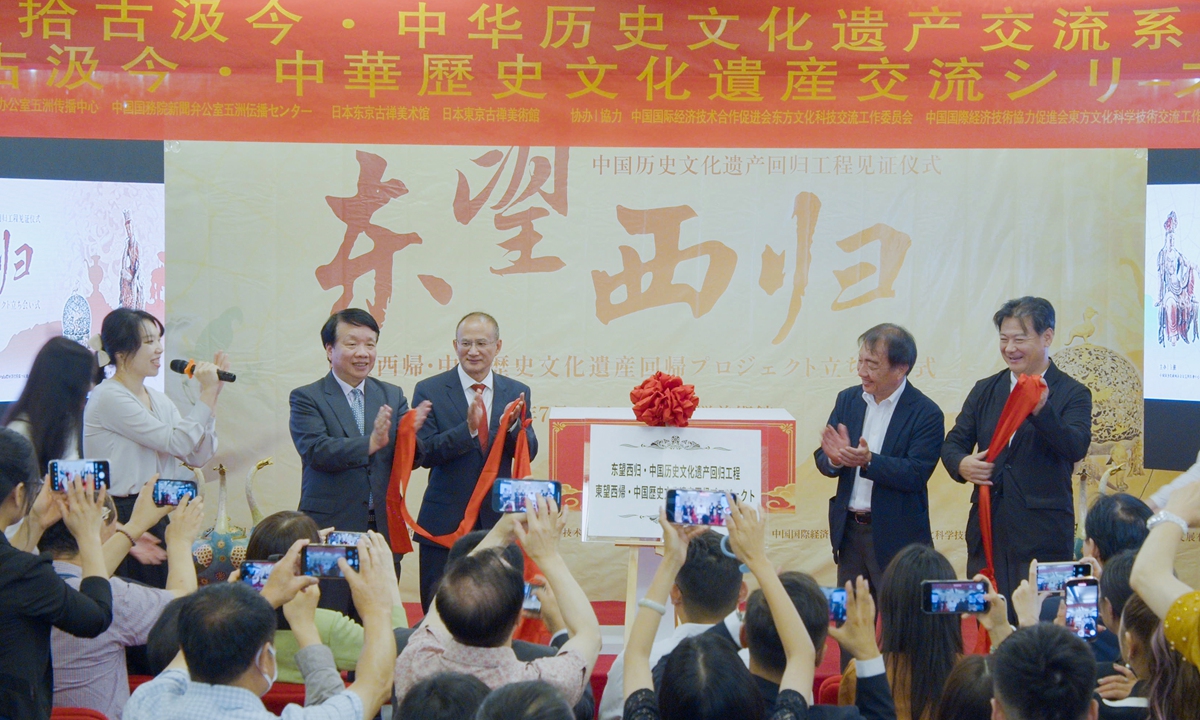
Photo: Courtesy of Intercontinental Communication Center
A new project that aims to aid in the return of Chinese historical and cultural relics scattered in Japan was launched in Japan on Tuesday. Among the first batch of relics to be returned to their home country are Ming Dynasty (1368-1644) Buddhist scriptures, a member of the project told the Global Times in an exclusive interview on Wednesday.
Project Dongwang Xigui literally means "looking east, returning west," as China is to the west of Japan. It is expected to promote the return of Chinese cultural artifacts scattered in Japan to China, provide important resources for research into the history, culture and art of China, and promote in-depth exchanges and cooperation between China and Japan in the fields of historical research and cultural heritage protection and inheritance.
On Tuesday afternoon, the Collecting the Past and Drawing on the Present, Chinese Historical and Cultural Heritage Exchange Series hosted by the Intercontinental Communication Center (CICC) was held in Tokyo. At this event, the nameplate of the return project was officially unveiled. According to the project member, the return of the first batch of heritage items scattered in Japan is currently being organized and should happen soon.
"Japan is one of the countries that has acquired the most Chinese cultural relics, whether through looting during modern wars or through other various illegal means. Previously, the focus of Chinese cultural relics' return has been mainly on Western countries. However, East Asia has received little attention in this regard. This joint project between China and Japan has significant positive value," Huo Zhengxin, a law professor at the China University of Political Science and Law, told the Global Times.
Japanese intellectuals also held a rally to promote the return of Chinese cultural relics in Tokyo on Saturday, demanding that Japan should return cultural relics looted during wartime from China. About 50 people from various parts of Japan attended the rally, the Xinhua News Agency reported.
Takakage Fujita, a co-representative of the rally, stated that many developed countries that invaded other nations and looted cultural relics in the past are now gradually returning these plundered artifacts. Fujita noted that correcting wrongs of the past is the first step toward reconciliation, and it is not right to keep looted cultural relics.
According to the group, the University Museum of the University of Tokyo collects and partially exhibits cultural relics from the Shangjing Longquan Prefecture Site of the Bohai Kingdom during the Tang Dynasty, which were plundered by Japan. The group demands that the University of Tokyo disclose all the cultural relics obtained through improper means and reveal their origins.
After the rally, a University of Tokyo student told Xinhua, "After listening to today's speech, I think we need to seriously understand history and return the cultural relics."
Voices like these among the Japanese public are certainly very beneficial for promoting the return of cultural relics, Huo noted. Going forward, he hopes that the initiation of this project will enable China and Japan to jointly conduct research on the Chinese cultural relics lost to Japan, thereby laying the groundwork for their return.
Huo also emphasized that this consensus on the return of cultural relics not only upholds historical justice but also shows that cultural relics can only display their true value when they are returned to the historical and cultural environment of their original country.



